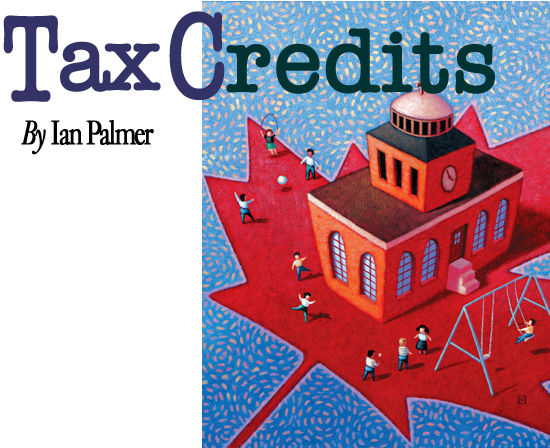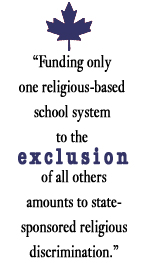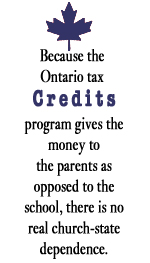Tax Credits
Ian Palmer May/June 2003
Getting your Trinity Audio player ready...

Illustrations by Paul Vismara

Many Canadian parents believe that the worldview permeating the country's public education system conflicts with their religious, personal, and moral convictions. So when the Ontario government introduced controversial legislation in mid-2001–legislation that called for private school tax credits–supporters of independent schools applauded the move. But critics decried the decision and argued, among other things, that funding independent schooling could not be justified when the cash-strapped public education system was drowning in red ink. Perhaps the most startling comments, however, came from human rights commissioner Keith Norton more than a year after the government's tax credit proposal. In his annual report, Norton said that the effects of the tax credit program in Ontario could very well be analogous to the effects apartheid had in South Africa.
"I communicated my concerns of the need to establish appropriate standards so this financial incentive does not inadvertently create racial, ethnic and religious divisions in our educational environment," Norton is quoted as saying. "I do have a concern that it could lead to an apartheid kind of system of education where each religious denomination may have its own schools, and it could also lead to the proliferation of schools based upon other principles that could lead to serious divisions in our community."
It's hard to fathom how Norton can find a strong connection between tax credits for independent schools and a regime that institutionalized racial discrimination as well as devised a strategy for territorial separation and police repression. But alas, he does so. His flawed logic–which assumes that independent schools are somehow more prone to lawlessness than their counterparts in the public realm–brings back memories of Thomas Hobbes' Leviathan, in which the author paints a disturbing picture of the lawless state. But what about the other objections coming from all over the spectrum of public discourse? For every person who has championed the tax credit policy there are politicians, teachers, and school boards that have expressed nothing but disdain. At the very least, the ensuing controversy warrants looking at some of the objections as well as some of the perceived benefits of tax credits for independent schooling.
Ontario Tax Credits
In May 2001 the Ontario government announced its support for equity and choice in education. The Equity in Education Tax Credit was especially designed to assist parents who wanted to have their children educated in an environment reflective of their religion or culture, but who were unable to shoulder the requisite costs. Proponents of the legislation immediately hailed Ontario's education tax credit plan–to be phased in over a five-year period–as the largest and least restrictive in North America. Phase one, already implemented, amounted to 10 percent of tuition up to a maximum of 0. For years two, three, four, and five the scheduled deductions will be 20 percent, 30 percent, 40 percent, and 50 percent. As such, the tax credit will be worth about ,500 per child on tuition of up to ,000 once fully implemented. Minnesota currently provides the largest state tax deductions for parents who send their children to private schools–up to ,500 a year. Critics who gnashed their teeth at the Ontario government's decision, however, did get a quasi victory when, during the 2002 provincial budget, the provincial government announced it would delay the second phase of the plan by one year, thus saving the government about million.
But support for independent learning seems to be increasing even as critics attack tax credits. In mid-2001, right after the government first announced the Equity in Education Tax Credit, sources reported that more than 102,000 Ontario children attended independent schools the previous year, while about 2 million attended the public schools. Furthermore, the province's independent school enrollment has increased by 34 percent over the past decade. The tax credits are expected to encourage even more parents to take another look at the independent schools option. For example, the tax credit plan stipulates that parents are eligible for the tax credit regardless of their income levels and regardless of whether they even earn enough to pay taxes. And there is no limit as to how many children can receive the credit. But critics have attacked the policy on a number of grounds. Proponents, however, have responded to these criticisms by saying that the tax credits policy really only remedies a shortcoming in the 1867 British North America Act.
Historically Speaking
The 1867 British North America Act was established between England and France, the two founding nations of Canada. Both sides agreed to ensure that the denominational rights to education of English-speaking Protestants and French-speaking Catholics would be supported via taxpayer funds. But a funny thing happened as Ontario opened its doors to more and more people from all around the world–the Protestant public school system eventually parted with its religious roots and emerged as a secular institution. Over the years representatives from other religious groups have confronted the provincial government because (prior to the tax credits legislation) it funded the Roman Catholic education system to the exclusion of all other faith-based schools. In 1999 the United Nations Human Rights Committee agreed with this reasoning and consequently announced that Canada had violated the International Covenant on Civil and Political Rights. The Ontario government denied that this ruling had influenced its decision to implement the tax credits program, but the end result remains the same, as parents and their children now have a greater degree of choice. "Funding only one religious-based school system to the exclusion of all others amounts to state-sponsored religious discrimination," said Bernie M. Farber, the executive director of the Canadian Jewish Congress. "Tax credits is something our organization has supported for a number of years," added Carol Devine, the director of political affairs and media relations for the Ontario Catholic School Trustees Association. "Our own Catholic education system is publicly funded. We respect the right for parents to send their children to faith-based schools." But there are still some issues that have been a point of contention, especially since the Ontario government committed to its tax credits policy.

Controversy
Will the tax credits program lead to divisions in the educational environment? Norton seems to think so. The human rights commissioner echoed sentiments expressed by some critics of tax credits when he said that independent schools–if not bound by certain standards–could divide society along racial, ethnic, and religious grounds. Norton wrongly assumes that independent schools will throw caution to the wind and ignore the Human Rights Code. Moreover, he also takes a gigantic leap in logic by assuming that independent schools with a religious, racial, or ethnic focus will plant seeds of ignorance, hatred, and intolerance in the minds of their students. As proponents of tax credits have suggested, the public education system is not the only place children can learn how to become productive, law-abiding members of society. "For us, it's a faith-based situation," said Farber. "Many of our children, their needs are not met in the public school system, with regards to religious holidays or kosher foods." Mark Kennedy, the director of the Association of Christian Schools International, Eastern Canada Region, says that independent schools–as well as tax credits–are about fairness. "If a student is from a Christian family, the best the public school can offer is perhaps one Bible class a day," said Kennedy. "But the Christian school provides a whole perspective on life." While Norton talks about division, Farber and Kennedy talk about choice–and the freedom to get an education in an environment reflective of one's religious beliefs or cultural background. Governments spanning the entire Western world have implemented various forms of educational options, and there have been no reports of the sorts of problems Norton talks about.
Most of the criticisms of tax credits have centered on the notion that funding independent schools somehow picks the pockets of public education. The government has reported that the fully implemented tax credit policy will cost taxpayers some 0 million, and critics have not ceased from throwing this figure into the government's face. Critics have essentially argued that this 0 million could be put to better use by spending it on the ailing public education system. But what do the proponents of tax credits have to say? "To say you have to deny funding to the public school system in order to fund private parochial education is a fallacy," said Glenn Stresman, director of development at the Concordia Lutheran Theological Seminary. He hastened to add that he was giving his personal opinion and not the opinion of the seminary, which as an institution of higher learning is therefore not affected by the tax credits policy. "I believe it is possible for the publicly funded system and the faith-based education system to both be adequately funded," said Devine, adding that all one has to do is look at other jurisdictions to see that a balance is possible. Kennedy said that the tax credits program may have been an indirect wake-up call for the public education system. "The government cutbacks on public education are aimed at the schools and school boards so that they'll get their acts together," said Kennedy. "Our schools spend their money more effectively than public schools. Our teachers are paid less and take on a lot more responsibilities." Farber voiced his opinion of the controversy by saying, "The government has already assured the school boards that no money will be taken from them to fund the tax credits program." When the government first announced its controversial tax credits program, it also added that the 0 million price tag would by no means be at the expense of public education.
Proponents of the tax credit policy suggest that the competition between public and private education systems could actually have the positive result of improving the overall quality of education in Ontario. As such, the policy probably could not have happened at a better time. According to a poll conducted by the Ontario Institute for Studies in Education of the University of Toronto, only 44 percent of Ontario residents are satisfied with the public school system. This figure is down from a high of 55 percent in 1982. Was the government's decision a wake-up call? Only time will tell.

Tax Break for the Rich?
Critics have also argued that the tax credits program represents some sort of lottery program wherein the rich become even more enriched at the expense of taxpayers. Kennedy disagrees. "Opposition parties, teachers unions, and school boards tend to represent the tax credits program as a benefit for the rich, but many of the students in our schools are from low-income families." The truth of the matter is that tax credits are necessary because many parents can scarce afford the tuition fees for independent schools. Suggestions that tax credits are a tax break for the rich are without basis. Another point worth mentioning is that the parents who decide to take part in the tax credits program are themselves taxpayers who contribute, in one way or another, to the upkeep and maintenance of the public education system. So if these same parents should opt to take part in the tax credits program, they should not be made to feel like freeloaders.
Church-State Separation?
Because the Ontario tax credits program gives the money to the parents as opposed to the school, there is no real church-state dependence. Using public money to fund independent schools has been a tradition in Canada, as several of the nation's provinces have adopted the practice. However, in provinces such as Alberta, British Columbia, and Manitoba the governments provide direct grants to the independent schools as opposed to the parents. The great divide between the state and the schools is not so great in these cases, but Ontario's system does provide some breathing room.
Farber was admittedly enthused when the Ontario government finally decided to implement a tax credit plan for private school education. "We've been after the government for years to provide funding for our schools," said Farber. Though he was upset at the government's decision to delay phase two, Farber nonetheless remains optimistic that the 10 percent hike will be reinstated within about a year. When asked if he foresees the day when all independent schools will be fully funded, as is the case with the Catholic education system, Farber said, "We're headed in that direction." On the other hand, Kennedy said that it is unlikely that independent schools will one day be fully funded. "It would be a feather in the cap of a free, fair, and tolerant society to fully fund independent schools," said Kennedy, "but it's not realistic." Devine says her organization supports the tax credit plan, but she added that "schools that do receive public funding criteria should have to meet certain standards." Farber, Kennedy, and Devine all expressed support for independent schooling, but this has not silenced the opposition, some of whom see similarities between tax credits and apartheid.
In 1950, two years after racial discrimination was institutionalized, the Population Registration Act mandated that all South Africans be racially classified into one of three categories, namely White, Black, or Coloured. At that time all Blacks were required at all times to carry so-called passbooks that contained their fingerprints, photo, and information on access to non-Black areas. The Public Safety Act and the Criminal Law Amendment Act, both passed in 1953, provided the government with power to declare states of emergency and increased penalties for protesting against a law. It would take decades before apartheid was finally abolished in South Africa, but the lingering consequences of the nation's shameful past remains an albatross around its neck. Let the same not be true for the independent school system in Ontario.

___________
Ian Palmer, a freelance journalist and avid observer of church-state issues, writes from Toronto, Ontario, Canada.